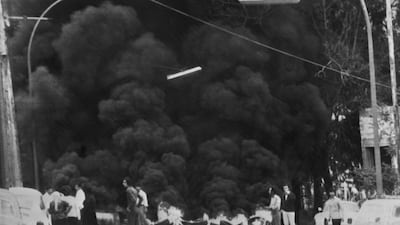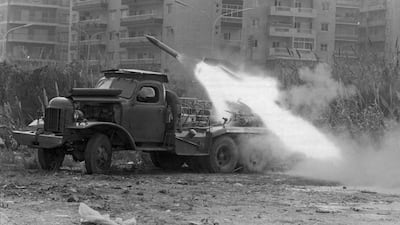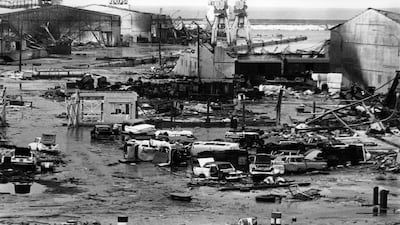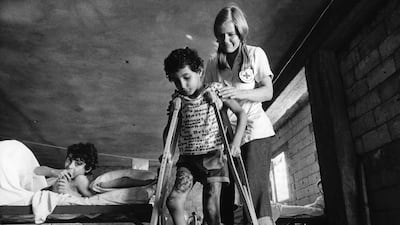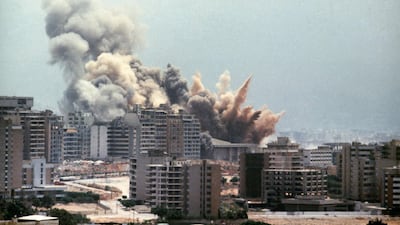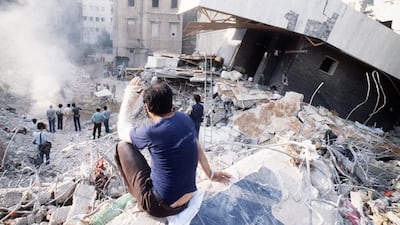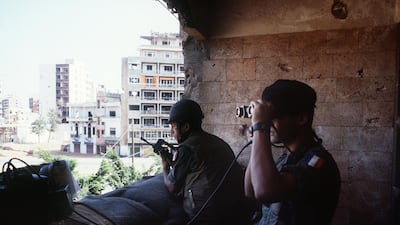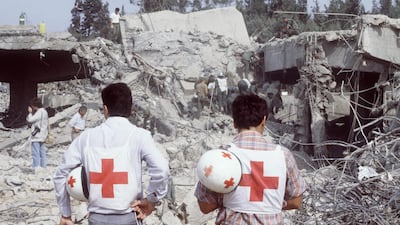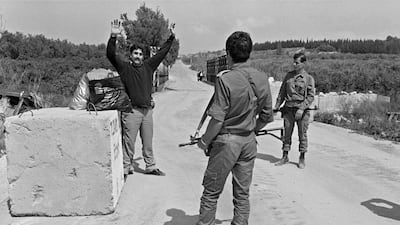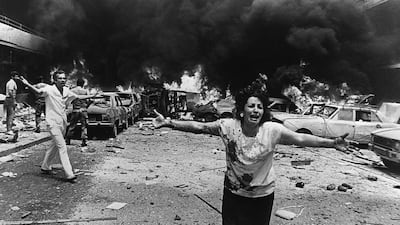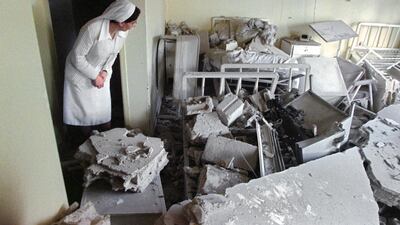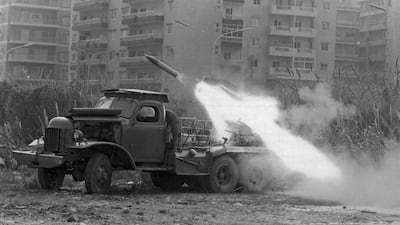Multiple actors in the Lebanese civil war “systematically” used sexually violence against women and girls, according to report by Legal Action Worldwide.
The report, which includes interviews with victims and witnesses, said it sets out for the first time the extent of gender-based crimes during the Lebanese civil war from 1975 to 1990.
The non-profit organisation said accountability over abuses committed during that period “has largely been absent and the use of transitional justice mechanisms in Lebanon has been limited”.
Commissioned by gender equality organisation UN Women, the report says multiple state and non-state actors and armed groups carried out sexual and gender-based violence against females, including rape, genital mutilation, sexualised torture and humiliation, and forced prostitution.
Rape via the use of foreign objects, for instance glass bottles, was reportedly common.
“Rape was used as a method of war to persecute persons from particular communities, to humiliate them, to break their resistance and to emasculate members of the family,” the report said.
“During sieges and massacres, women and girls were divided according to their nationality. In many cases, perpetrators killed women and girls after raping them. Women and girls were raped in their homes and in the streets and in front of their family members, after which they were killed.”
Researchers spoke to a 75-year-old woman who witnessed 19 girls aged from 9 to 15 being taken to a camp.
“They were in an indescribable state. They had blood stains all over their clothes and legs. They were raped with bottles,” she told LAW.
“I saw a man who was crying. He told me that two of them were his daughters and that the younger one was not among them, because she had died. She was raped with a bottle and the bottle broke inside her.”
Women and girls were sometimes forced to have sexual relations with militiamen in return for food and protection.
“Sexualised torture was perpetrated in detention centres, at checkpoints, and in the streets during sieges and massacres. In detention, male officers electrocuted victims’ nipples, breasts, and genital areas, and intensified physical assaults when victims were menstruating,” the report said.
“Women and girls as young as 12 years old had their legs tied to two cars, which were driven in opposite directions, wrenching the victim in two from the crotch up, and resulting in death. Women were also killed in this way, but with militiamen holding the legs of the victim and wrenching them apart.”
Women and girls were killed and abducted in front of family members in retribution, with pregnant women and new mothers also murdered, it said.
LAW also reported an increase in violence from male family members towards their relatives, often amid stress, trauma and poor living conditions.
“With this report, we are seeking to contribute to the body of work produced in Lebanon that shines a spotlight on the gendered impact of Lebanon’s civil war, and its long lasting legacy — which includes today’s heightened levels of violence against women and continued stigma for those who survived these crimes,” said Rachel Dore-Weeks, the head of UN Women Lebanon.
“Without acknowledging and understand the past, we cannot build a peace and stable future,” she said.
Haircare resolutions 2021
From Beirut and Amman to London and now Dubai, hairstylist George Massoud has seen the same mistakes made by customers all over the world. In the chair or at-home hair care, here are the resolutions he wishes his customers would make for the year ahead.
1. 'I will seek consultation from professionals'
You may know what you want, but are you sure it’s going to suit you? Haircare professionals can tell you what will work best with your skin tone, hair texture and lifestyle.
2. 'I will tell my hairdresser when I’m not happy'
Massoud says it’s better to offer constructive criticism to work on in the future. Your hairdresser will learn, and you may discover how to communicate exactly what you want more effectively the next time.
3. ‘I will treat my hair better out of the chair’
Damage control is a big part of most hairstylists’ work right now, but it can be avoided. Steer clear of over-colouring at home, try and pursue one hair brand at a time and never, ever use a straightener on still drying hair, pleads Massoud.
Specs
Engine: 51.5kW electric motor
Range: 400km
Power: 134bhp
Torque: 175Nm
Price: From Dh98,800
Available: Now
Company%20Profile
%3Cp%3E%3Cstrong%3ECompany%20name%3A%3C%2Fstrong%3E%20Cargoz%3Cbr%3E%3Cstrong%3EDate%20started%3A%3C%2Fstrong%3E%20January%202022%3Cbr%3E%3Cstrong%3EFounders%3A%3C%2Fstrong%3E%20Premlal%20Pullisserry%20and%20Lijo%20Antony%3Cbr%3E%3Cstrong%3EBased%3A%3C%2Fstrong%3E%20Dubai%3Cbr%3E%3Cstrong%3ENumber%20of%20staff%3A%3C%2Fstrong%3E%2030%3Cbr%3E%3Cstrong%3EInvestment%20stage%3A%3C%2Fstrong%3E%20Seed%3C%2Fp%3E%0A
The%20specs
%3Cp%3E%3Cstrong%3EEngine%3A%3C%2Fstrong%3E%201.5-litre%204-cylinder%3Cbr%3E%3Cstrong%3ETransmission%3A%20%3C%2Fstrong%3ECVT%3Cbr%3E%3Cstrong%3EPower%3A%20%3C%2Fstrong%3E119bhp%3Cbr%3E%3Cstrong%3ETorque%3A%20%3C%2Fstrong%3E145Nm%3Cbr%3E%3Cstrong%3EPrice%3A%20%3C%2Fstrong%3EDh%2C89%2C900%20(%2424%2C230)%3Cbr%3E%3Cstrong%3EOn%20sale%3A%20%3C%2Fstrong%3Enow%3C%2Fp%3E%0A
Test
Director: S Sashikanth
Cast: Nayanthara, Siddharth, Meera Jasmine, R Madhavan
Star rating: 2/5
UAE currency: the story behind the money in your pockets
UPI facts
More than 2.2 million Indian tourists arrived in UAE in 2023
More than 3.5 million Indians reside in UAE
Indian tourists can make purchases in UAE using rupee accounts in India through QR-code-based UPI real-time payment systems
Indian residents in UAE can use their non-resident NRO and NRE accounts held in Indian banks linked to a UAE mobile number for UPI transactions
CHATGPT%20ENTERPRISE%20FEATURES
%3Cp%3E%E2%80%A2%20Enterprise-grade%20security%20and%20privacy%3C%2Fp%3E%0A%3Cp%3E%E2%80%A2%20Unlimited%20higher-speed%20GPT-4%20access%20with%20no%20caps%3C%2Fp%3E%0A%3Cp%3E%E2%80%A2%20Longer%20context%20windows%20for%20processing%20longer%20inputs%3C%2Fp%3E%0A%3Cp%3E%E2%80%A2%20Advanced%20data%20analysis%20capabilities%3C%2Fp%3E%0A%3Cp%3E%E2%80%A2%20Customisation%20options%3C%2Fp%3E%0A%3Cp%3E%E2%80%A2%20Shareable%20chat%20templates%20that%20companies%20can%20use%20to%20collaborate%20and%20build%20common%20workflows%3C%2Fp%3E%0A%3Cp%3E%E2%80%A2%20Analytics%20dashboard%20for%20usage%20insights%3C%2Fp%3E%0A%3Cp%3E%E2%80%A2%20Free%20credits%20to%20use%20OpenAI%20APIs%20to%20extend%20OpenAI%20into%20a%20fully-custom%20solution%20for%20enterprises%3C%2Fp%3E%0A
Match info
Wolves 0
Arsenal 2 (Saka 43', Lacazette 85')
Man of the match: Shkodran Mustafi (Arsenal)
